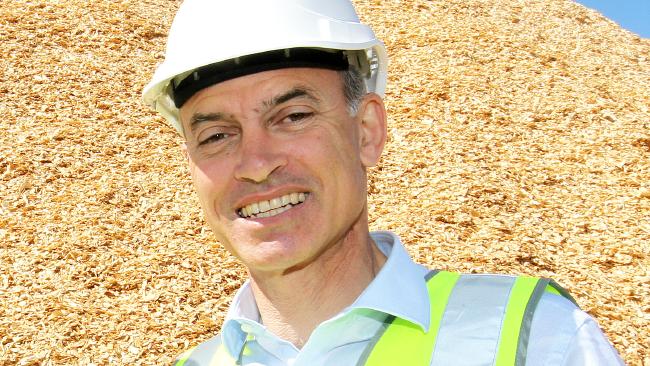Matthew Groom’s “Climate Action 21” is clearly deficient, but it’s all we have.

Guy Barnett’s proposed revival of logging in currently-protected native forest is incompatible with Matthew Groom’s climate plan. PHOTO Bruce Mounster, The Australian
Highly predictable and monumentally dumb: that was the decision by the American president to turn his back on our faltering collective effort to contain greenhouse emissions.
Equally stupid was the celebration of Donald Trump’s announcement by his acolytes in Australian parliaments, who share his ignorance of the science around climate change and his arrogant indifference to its ramifications.
It’s against that depressing background that Tasmanians are invited to appraise their new climate strategy, which the government released in its final form last week.
Environment minister Matthew Groom, with the support of premier Will Hodgman, has resisted internal demands from the Liberals’ anti-science ideologues for “Climate Action 21” to be mere window-dressing, or shelved altogether. Tasmanians should be thankful for that.
We should also be thankful that Groom acknowledges the “serious and urgent challenge” of climate change and has heeded some of the criticism of the plan’s first draft of December 2015, notably in toning down the hubris about Tasmanian climate leadership.
The plan supports more climate research including a revival of the mothballed “climate futures” modelling program, and a stronger focus on potential climate risk including the threat from coastal and river flooding, coastal erosion and large-scale bushfires.
These measures can be expected to have widespread support, but actions to limit emissions are more controversial. The ideologues oppose any action that implies a current, specific threat from greenhouse warming, like a strong near-term emissions or renewable energy target.
Effective, measurable actions to mitigate emissions were targeted by the Paris Agreement as being of critical importance. But this is where the Tasmanian plan is weakest, leaving a large part of the heavy lifting, such as it is, to community or individual initiatives.
Such actions must be strategically focused on major sources of greenhouse gases, which in Tasmania have historically been land transport and forest harvesting. Over the past decade a forestry downturn has seen emissions from that source decline dramatically. (Against that, Tasmania has been importing substantial amounts of coal-fired electricity, but that is accounted for in Victoria, where it is generated.)
The plan supports greater use of public transport and greater energy efficiency in offices, factories and homes, but the signature abatement measure is a legislated 2050 zero net emissions target – strong enough to look good but far enough into the future to be undemanding, at least not yet.
If he wants to keep emissions within limits Matthew Groom needs to have a serious conversation with his colleague, resources minister Guy Barnett, about Barnett’s plan to revive native forest harvesting. As the plan clearly shows, old forestry practices are incompatible with meeting emissions targets.
This is the third attempt at a climate strategy since Tasmania’s only climate legislation passed in 2008. The first two were discarded after elections in 2010 and 2014 respectively. With another election due by next March this one is in danger of going the same way.
Climate Action 21 is nothing to write home about. Even if it is fully implemented it will have little impact. Yet it is all we have to show for nearly a decade of political wrangling over what Tasmania should do about the climate challenge. I call that a failure.
Matthew Groom should not have to shoulder all the blame for this. I believe him when he says he wants an effective climate policy, but his plan is inadequate because a determined minority of people in his party believes that mitigating emissions is a waste of time and money.
This will not be the last word on state climate action. Parliament’s burden grows as each month passes, and eventually the pressure to act will be so great that even the most recalcitrant politicians will be forced to support effective abatement measures.
It would be nice to think that leaders of all parties could agree to neutralise the opportunism that has so bedevilled this state’s, and Australia’s, climate response. If that happened, Tasmania would be a real climate leader.
Those opportunists are playing us for fools, and Trump’s renouncing of the Paris Agreement has given strength to their arm. The victims are those who try today to make a difference, but ultimately it will be all of us.
